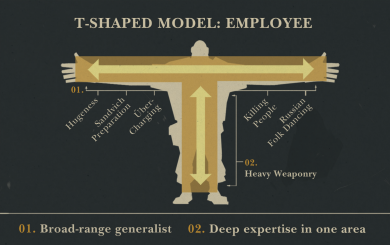Flounder Mode #2: The T-Shaped Employee, and SWE Specialization

In my first year at Gusto, I remember getting dinner and drinks with a senior engineer I was working on a project with. I asked him a question that was bothering me as a junior engineer.
“How do I know when I should specialize in a certain area of engineering? How do I know if I’m a front-end engineer, back-end engineer, or something else?”
He gave me a response that I’ll always remember:
“I just try and be a good engineer. I’m not a back-end engineer or a front-end engineer. Just a plain old engineer. I think specialization can corner you too early if you’re not careful.”
I didn’t know it would stick with me so much until later on at Gusto. At around year two or three, I had a small six month stint as a Design Systems engineer, mainly because I thought I was interested in front-end, and that working with the Design Systems team would help grow and bolster my love for it.
While that experience did teach me a lot, I was firmly locked into the Design Systems space for a bit. The thing about Design Systems is that you are really a kind of infrastructure team, so domain-specific opportunities tend to not come your way.
What I considered juicier business and career opportunities at Gusto were nabbed by generalist peers that weren’t firmly in a specialization bucket yet.
Upon reflection, I believe I specialized a little too early for a little too long. After my stint, I was determined to boomerang back to the generalist track, and not just peg myself as a front-end focused engineer anymore.
I’m always glad I made that choice for myself. But a secondary, follow-up question itched at me for awhile after.
“How do you reconcile a passion for a certain engineering skill tree, with the benefits of being a generalist?”
Obviously, software engineering encompasses so many different skills. It’s impossible to be good at all of them. Because engineers themselves are so diverse, they naturally feel a pull to specialize on what they’re passionate about.
However, in a world that changes as fast as technology, there is a risk that specializing in a skill you’re passionate about will force you to re-skill when that speciality isn’t relevant anymore, or as new skill trees emerge. (This is especially relevant in the age of AI.)
I got a great answer to this second question from one of my managers at Gusto later on:
“Strive to be the T-Shaped employee. You need to have a broad range of skills you can always rely on, but a specialization you can go deep in to stay motivated.”

T-Shaped employees provide incredible value because they are theoretically adaptable to any project, yet have one area of deep specialization they are passionate about and can be multipliers in if needed. They are not asked to be good at everything but just good enough to get urgent and important jobs done.
This is especially important at startups where the ratio of engineers to jobs-to-be-done is far too small. Being a T-Shape at a smaller startup is a necessity, not a nicety!
However, it is hard to be a T-Shape, at least in some respects.
It’s not hard to stay motivated about the “deep” part of the T: that part comes naturally as a part of passion and interest.
It’s the horizontal part of the T that is difficult to maintain. It requires going out of your way to do projects that might not be in your natural skillset, which you might be only willing to do so often. But my recommendation is that even tiny opportunities can help maintain the T-Shape.
Most companies these days, for example, still do the internal quarterly hackathon, and that is a great opportunity to grind your gears on something new. If your company has a good PTO policy, taking a day off to just explore new trends or start a side project is another great way to keep your T-Shape in form. Picking up a ticket or two that’s out of your wheelhouse per development cycle can also get you out of your comfort zone.
I’ve found sticking to this as a career principle has opened up a lot of doors at the companies I’ve worked at. Funnily enough, I had the opportunity to do highly visible Design Systems related projects at Cocoon because of the time I spent doing it at Gusto. It turns out, that six-month stint had a payoff that was so far in the future, I couldn’t even see it coming!
You never want to say “no” to a huge opportunity because you don’t have the minimum skillset required to be effective. Spend time growing your T-Shape, and you’ll always be ready when the opportunity comes knocking at your door.